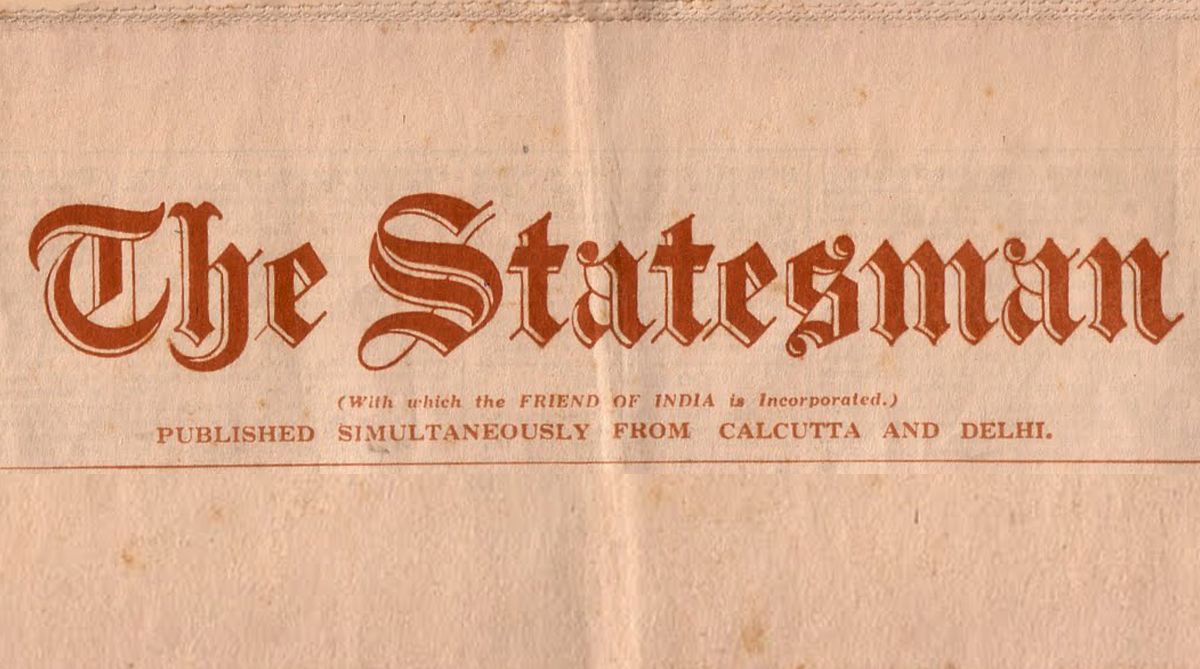A New Day, A New Dawn
There is a surprise for the readers. A special Poila Boishakh gift from none other than West Bengal chief minister Mamata Banerjee. Who has written a piece for this special edition.
On this day a century ago, these were some of the news items The Statesman readers got to read about India and the world.

OCCASIONAL NOTE
The Inter-Allied Scientific Food Commission has been carefully considering the position of fat in the diet, as the supply of fatty food is evidently the most serious part of the problem the Commission has to deal with. It has come to the conclusion that a minimum ration of fat, amounting to 75 grams, or a little over 2 and half ounces, is necessary every day for the average man. It considers that it may be necessary to maintain a certain stock of animals to make good the deficit of fat likely to exist after fats of vegetable origin have been used to the fullest extent. Of course it is pointed out that the human system possesses the power of manufacturing the fat it needs from carbohydrate food, and that it is mainly from this source that cattle are fattened for the market.
On the other hand, human beings find it more comfortable to take the fat they need in more concentrated form, their capacity for the ingestion of food being more limited than in the case of animals. The longer time that fat takes to digest as compared with carbohydrates is also a point in its favour, as it staves off the feeling of hunger for a longer period. It is generally agreed that children need a larger proportion of fatty food than adults. Infants get about 50 per cent of the food they need in fat; in the case of children the proportion should be about 35 per cent, and in the case of adults from 20 to 25 per cent.
Advertisement
THE FEVER EPIDEMIC IN BOMBAY
Their Excellencies Lord and Lady Willingdon, accompanied by the Municipal Commissioner, Executive Health Officer and Commissioner of Police, went round the city this morning inspecting the Municipal dispensaries and hospitals where hundreds of “mystery fever” cases are being treated. Subsequently their Excellencies, accompanied by Mr. N.M. Joshi of the Servants of India Society, visited Queen’s Road cemetery and the Kaines Road Hindu burning ground.
The request of Dr. Turner, Executive Health Office, Bombay Municipality, to the Military authorities for a big hospital for the present epidemic cases has been promptly met, and the authorities have placed at the disposal of the Health Department about 500 beds at Dadar Military camp. Two military motor ambulances have been placed at the disposal of the Municipality. The Health Department has widely distributed handbills throughout the city in various vernaculars informing the public that medicine and milk would be given free if required at thirteen different dispensaries. Relief work by voluntary workers was also started.
THE RISE OF PRICES
Mr. Gavin Scott, President of the Rangoon Municipality, who went on seven weeks’ leave has been recalled to duty at the request of the local Government in order to deal with the question of stocks and prices, he being the most suitable officer to take action under the Defence of India Act Rules.
The telegram from the local Government to the Municipal committee referred to the rise in the prices of necessaries and says that from account which have reached the Lieutenant-Governor, early action appears necessary.
The rice market rose today and Java shippers are paying Rs 400 and over for rice to fulfill their engagements for which they have already got licences. There is much discussion as to how the Government will obtain rice for Madras at the present price. Open market purchases would be very costly. Local prices at present make shipping to India almost impossible.
BRITISH JOURNALISTS IMPRISONED
The Daily Chronicle has received a despatch from its correspondent, who is imprisoned in the fortress of St. Peter and St. Paul in Petrograd. The correspondent says that he and the correspondents of the Times, Morning Post and Daily Express were arrested the day after the murder of Commander Cromie, with the British vice-Consul and chaplain, and imprisoned in a room in the prefecture of Police with 30 others, British and French subjects, and Russian criminals.
Eventually, in consequence of overcrowding, the British and French and a few others, including some septuagenarians were marched through the streets to the fortress of St. Peter and St. Paul, where batches of twenty were put in cells where under the old regime only one was confined. Here they sleep on a stone floor and are fed twice weekly with putrid food.
Advertisement